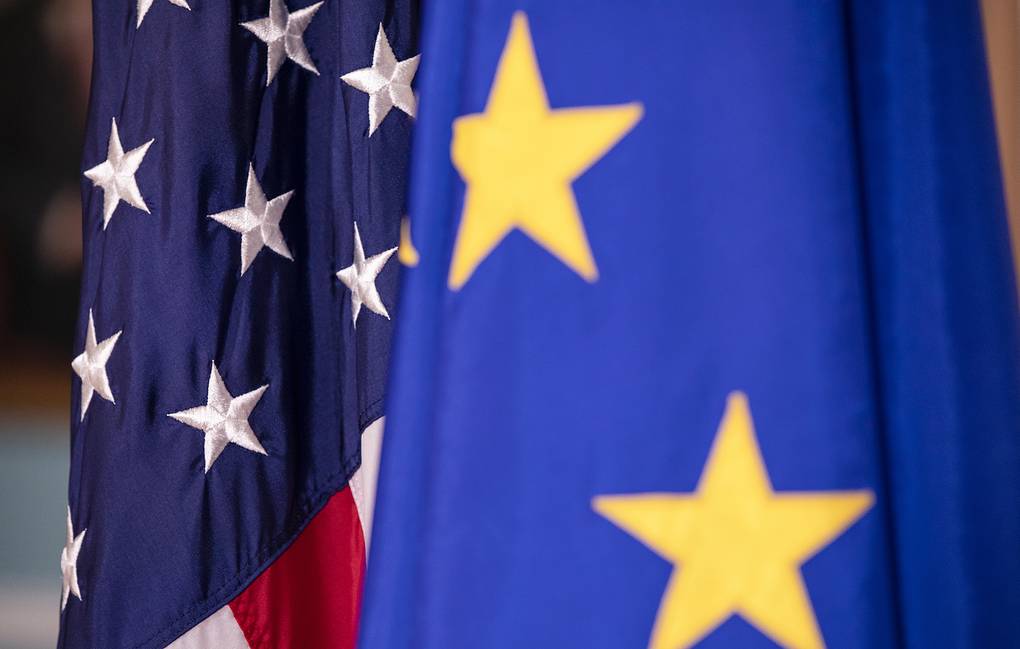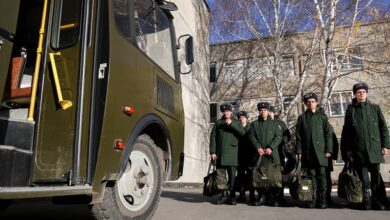Press review: EU seeks to join US on Ukraine plan as Russia boosts security in Africa
Top stories from the Russian press on Friday, November 21st
MOSCOW, November 21. /TASS/. Europe seeks to join discussions of Washington’s plan for Ukraine; Russia continues to assist in maintaining security in Africa; and Tokyo plans to continue purchasing Russian gas despite US pressure efforts. These stories topped Friday’s newspaper headlines across Russia.
Media: Europe seeks to participate in discussions of US plan for Ukraine
Europe wishes to join talks on resolving the Ukraine conflict. However, it’s not about the European Union as a whole but individual countries — France, the United Kingdom and Germany, a European diplomatic source told Izvestia. Meanwhile, a US-drafted 28-point peace plan has surfaced in the media, which particularly provides for Russia’s control over Donbass, a major reduction in the Ukrainian army’s size, and Ukraine’s move to abandon long-range weapons.
Brussels has distanced itself from Washington's initiative, saying the option under discussion actually means capitulation for Ukraine. Experts are confident that Europe may try to interfere in the emerging negotiation process in order to disrupt it. First of all, Europe may try to persuade Vladimir Zelensky to fight to the bitter end and refuse to sign any plans, Bogdan Bezpalko, a member of the Russian Presidential Council for Interethnic Relations, noted. "The EU could send more money to Ukraine, while its members could promise defense, financial, diplomatic, and other kinds of support to Kiev. They could even deploy troops to the [western Ukrainian] city of Lvov or promise Zelensky to establish a no-fly zone using NATO countries’ air defenses," he added.
Western media reports of a new peace proposal on Ukraine being in the works may be a signal of bargaining on the part of the White House, political scientist Alexander Nemtsev told Vedomosti. A tentative document was outlined during talks between the Russian and US presidents in Anchorage back in August, but there has been no progress in its implementation since, the expert went on to say. However, after a major corruption scandal broke out in Ukraine, Washington moved to pressure the Kiev leadership using the media as a tool, Nemtsev noted. "The US administration probably finds it important to demonstrate Trump’s foreign policy achievements with regard to Ukraine," the expert added.
In theory, Kiev will be ready to come to the negotiating table if the Ukrainian army and government face a critical situation the way they did in 2014, when the Minsk process was launched, Nemtsev observed.
Meanwhile, Oleg Barabanov, program director at the Valdai International Discussion Club, believes that Kiev will not agree to engage in negotiations. The draft document circulating in the media runs clearly counter to its position, while the ongoing corruption scandal is pushing Ukrainian elites even farther from a peace agreement because otherwise, they risk being labeled as traitors by the public and facing financial fraud accusations, the analyst explained.
Izvestia: Russia works to assist in maintaining security in Africa
Russian instructors continue to support the Central African Republic’s authorities in maintaining security in areas bordering Sudan. They participate in mop-up operations against militants from anti-government groups and in negotiations on their disarmament, a spokesperson for the Russian embassy in Bangui told Izvestia.
The Central African Republic has notably improved its security situation in the past five years. After a crisis broke out in 2020, with militants approaching the capital, the government, backed by Russian instructors and the national army, has managed to regain control over almost the entire country.
Defense cooperation is part of a broader partnership between Moscow and Bangui. International restrictions on the Central African Republic’s diamond exports were lifted in 2024, with Russia actively lobbying for the move within the Kimberley Process. Cooperation on humanitarian issues is also important: in 2024, Russia provided 50,000 metric tons of wheat to the Central African Republic free of charge, making it possible for the country to meet its annual demand for grain.
Cooperation with Bangui is in line with Moscow’s policy aimed at strengthening ties with the countries of the Global South, of which "the export of security" is a key element. This means a comprehensive approach covering military training, measures to ensure food security, knowledge transfer and the development of administrative systems. In short, it is about providing support to enhance the stability of states.
Meanwhile, the two countries’ defense ministries are working on the creation of a Russian military base in the Central African Republic.
Moscow and Bangui have always maintained a high level of cooperation, while Russia’s contribution to stabilizing the situation in the Central African Republic is highly appreciated, said Nikita Panin, Africa expert at the Higher School of Economics and the Russian Academy of Sciences. According to him, the Central African Republic fits well into the overall vector of Russia’s Africa policy, which is focused on strengthening security, boosting partnerships, and promoting long-term cooperation.
Izvestia: Tokyo plans to continue purchasing Russian gas
Tokyo has no plans to abandon Russian gas purchases, a spokesperson for the Japanese embassy in Moscow told Izvestia. Despite a new round of US pressure, the country "will do its utmost" to maintain stable supplies within the Sakhalin-1 project.
The Japanese have already taken note of the fact that Russia’s liquefied natural gas (LNG), targeted by sanctions, is provided to China at 20-30% below the market price, Olga Dobrinskaya, senior researcher at the Russian Academy of Sciences’ Institute of China and Contemporary Asia, pointed out. Tokyo sees the strengthening of sanctions as a factor creating even more favorable conditions for China as the main buyer of Russian hydrocarbons.
Meanwhile, Japan continues to face risks related to trade with Russia. US President Donald Trump asked Japan’s Prime Minister Sanae Takaichi during his recent visit to the country to stop importing Russian energy. Besides, US lawmakers are promoting a bill imposing tariffs of up to 500% on the countries purchasing Russian oil and gas. The move would be primarily directed against India, China, and Brazil, but US allies such as Japan and South Korea could also be hit by those sanctions.
Still, Washington is unlikely to introduce additional restrictions on Japan over its energy imports from Russia, Oleg Kazakov, senior researcher with the Center for Japanese Studies at the Russian Academy of Sciences’ Institute of China and Contemporary Asia, believes. "After all, Japan is a close US ally and the United States prefers it to help Washington organize a security system in the Asia-Pacific region," the expert elaborated.
However, increasing pressure from the US and Washington’s desire to focus Tokyo on participating in a planned LNG project in Alaska are creating a less favorable environment for future Russia-Japan cooperation, Kazakov noted. Still, Japan currently has no real alternative to Russian LNG, Dobrinskaya stressed.
There is hope for a shift in relations between Moscow and Tokyo, but everything will depend on the specific steps that Tokyo takes, the analyst pointed out. Japanese Prime Minister Sanae Takaichi announced intentions to pursue a policy aimed at resolving "the territorial issue" and signing a peace treaty with Russia, but it remains to be seen what direction relations will take.
Kommersant: West expects changes as Kosovo faces political crisis
Kosovo’s ruling Self-Determination party led by Prime Minister Albin Kurti failed to form a government in the nine months since the February election, and snap parliamentary elections will now be held there. Experts warn that it could further worsen the image of Kosovo, whose current leader has already seriously damaged relations with the West, Kommersant writes.
The situation is complicated by the fact that Kosovo President Vjosa Osmani’s term expires in April, and parliament will need to elect the next president. If a candidate fails to secure the necessary majority, parliament will once again be dissolved and another election will be called.
Kosovo appears on the international stage as a failed state due to a lack of political agreements that are vital for democracy, said Albert Krasniqi, an expert at the Pristina-based non-profit organization Democracy Plus.
Experts believe that perhaps the most important reason behind Kosovo’s numerous problems is that Kurti has significantly deteriorated relations with the West. His government accelerated the replacement of Serbian licence plates with Kosovo plates, banned the use of Serbian dinar in northern Kosovo, which is predominantly inhabited by Serbs, and closed branches of Serbian banks and other organizations there. Without questioning whether the measures were reasonable, the EU and the US strongly criticized Pristina for acting unilaterally, without consulting its Western partners or reaching an agreement with Belgrade. All this led to the suspension of normalization dialogue between Kosovo and Serbia, which the West has been actively promoting.
Last year, the European Union introduced sanctions on Kosovo, cutting financial assistance and suspending high-level contact with the Kosovo leadership, except for communication within Kosovo’s dialogue with Serbia. Earlier, the US threatened to sever "partnership relations" with Pristina for the first time since Kosovo declared independence in February 2008. That said, the West will now closely look forward to the outcome of Kosovo’s snap elections.
Rossiyskaya Gazeta: How US sanctions affect Russian oil exports
Reports of Russia’s declining oil exports and rising discounts on Russian oil appear almost every day. The latest US sanctions, which target Russia’s two biggest oil companies — Rosneft and Lukoil — are seen as the cause, Rossiyskaya Gazeta reports.
Although it has been just a month since the sanctions were announced, and restrictions on Rosneft come into effect on November 21 and Lukoil has been granted a respite until December 13, the media has done its job, creating a kind of panic on the market. Making things more complicated is the fact that Russia does not release official statistics on oil exports, and those interested have to rely on foreign sources. However, they have not indicated a collapse in Russian oil exports over the past month. Rather, it’s about a decline in supplies over the past year and a certain fall in mid-November. However, it makes more sense to attribute the latter fact to adjustments in supply chains due to the US sanctions, rather than to buyers’ refusal to purchase Russian oil.
Daniil Tyun, head of client relations at the AMCH company, points out that the US is increasing pressure on Russian oil, but it is doing it by using prices as a tool, not by causing supplies to collapse. It’s not a catastrophe but a major adjustment of logistics and the discount model. Russian oil will continue to be exported to Asia, but discounts will be higher and logistics costs will also rise. Supplies are declining, but slowly: the drop has reached about 6-9% compared to the average level recorded in the summer.
Freedom Finance leading analyst Natalya Milchakova emphasizes that the government maintains its 2025 oil output forecast at 510 million tons. If the authorities expected a major drop in exports, they would have revised the forecast. Russian oil exports are most likely expected to fall by 2-3% in 2025.
According to Oleg Abelev, head of analytics at the Ricom Trust investment company, Russian companies will have to adapt. They will actively develop workarounds to sell oil, using shadow fleet vessels and routes through third countries.

